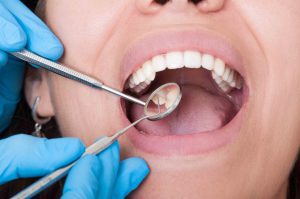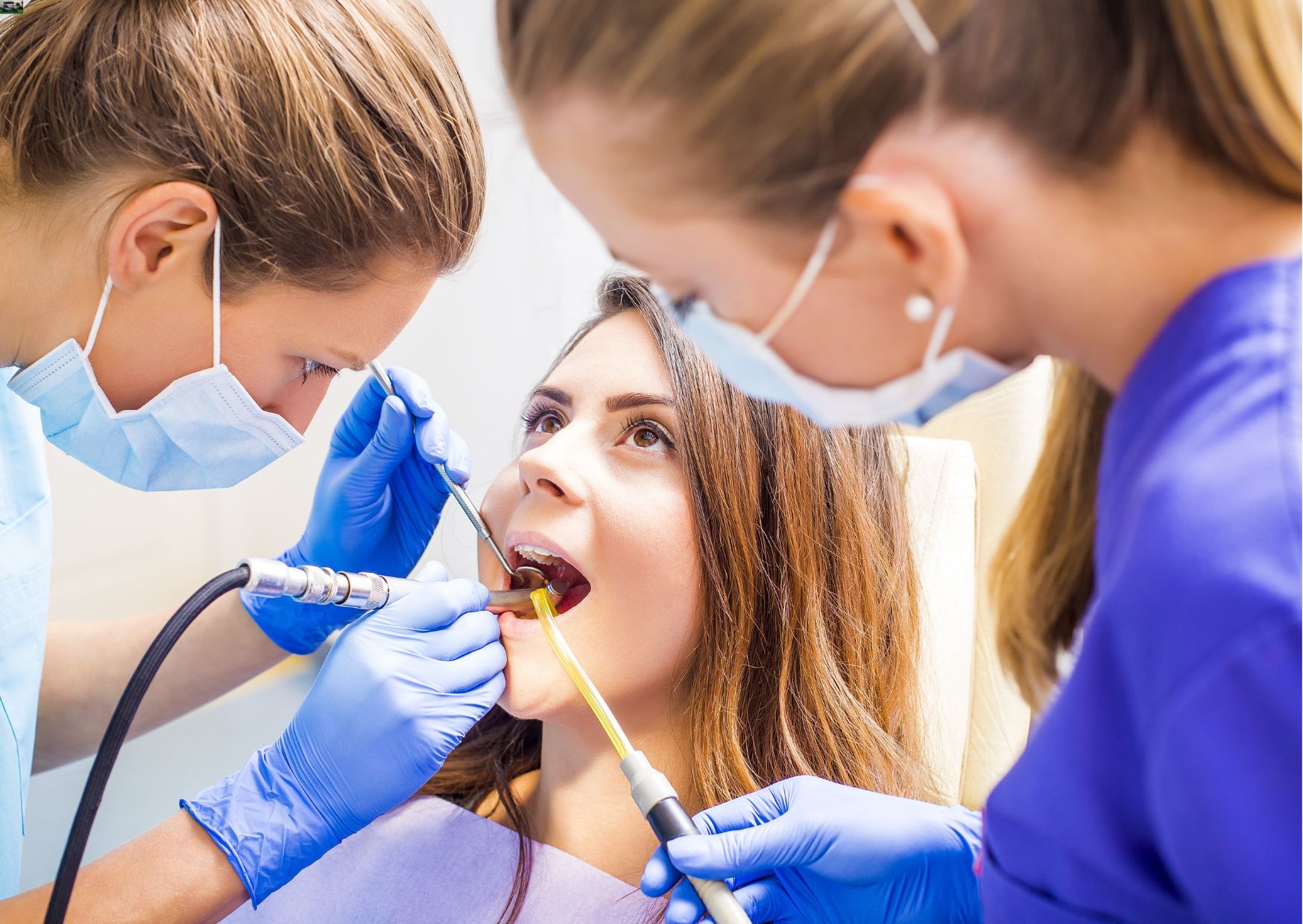Become a dental hygienist requires a licensed member of the oral health team who provides educational, preventive, and therapeutic services to promote and maintain good oral health and function, supporting systemic health.

What are the Main Types of Dental Hygienists?
The main types of dental hygienists include clinical hygienists, who provide direct patient care; community hygienists, who focus on public health and education; and research hygienists, who conduct studies to advance dental care and treatment methodologies.
Clinical Dental Hygienists
Clinical dental hygienists are oral health professionals who work directly with patients in dental settings, focusing on preventive care, oral assessments, cleanings, fluoride treatments, and patient education.
Role and Key Responsibilities:
A person who holds this speciality is known as a clinical dental hygienist and works with patients within a dental office, providing preventive and oral health care, along with educating patients.
Community Dental Hygienists
Community dental hygienists are professionals who deliver preventive dental care and oral health education in non-traditional settings, such as public health programs, schools, nursing homes, and community clinics, focusing on underserved populations.
Role and Key Responsibilities:
Community dental hygienists are dental hygienists who work in public health and provide oral health education and preventive services in communities.
Dental Hygienist Educators
Dental hygienist educators are professionals who teach and train students in dental hygiene programs, preparing them for careers as dental hygienists.
Role and Key Responsibilities:
Dental hygienist educators teach and train future dental hygienists in academic settings, focusing on oral health education and clinical skills development. They prepare students for professional practice by emphasizing evidence-based care and ethical standards.
Research Dental Hygienists
Research dental hygienists conduct studies to advance dental hygiene, improve patient care, and develop new treatments through evidence-based research.
Role and Key Responsibilities:
Dental hygienists involved in research explore new methods and technologies to improve oral health care, aiming to enhance patient treatment and outcomes through innovative practices.
What does a Dental Hygienist do?

Dental hygienists perform comprehensive oral health assessments, clean teeth, apply preventive treatments, educate patients on oral care practices, take dental X-rays, and support dentists during procedures to ensure optimal dental health and patient comfort.
Conducting Oral Health Assessments
Dental hygienists conduct oral health assessments to identify dental issues and diseases early, ensuring effective treatment and prevention strategies for patients.
Performing Teeth Cleanings and Scaling
They perform teeth cleanings and scaling procedures to effectively remove plaque, tartar, and stains from the teeth, contributing to improved oral hygiene and overall dental health.
Applying Preventive Treatments
Dental hygienists administer preventive treatments like fluoride applications and dental sealants as part of their role in safeguarding dental health. These treatments help to strengthen teeth against decay and provide protective barriers to maintaining oral hygiene.
Educating Patients on Oral Hygiene Practices
Dental hygienists educate patients on effective brushing, flossing, and oral hygiene practices to maintain dental health.
Taking and Developing Dental X-Rays
Dental hygienists capture and process dental X-rays to aid in diagnosing oral conditions, ensuring accurate imaging and patient safety throughout the process.
Assisting Dentists During Procedures
They assist dentists by providing support and patient care during dental procedures, ensuring the comfort and well-being of patients throughout the treatment process.
Average Salary Range of a Dental Hygienist
Dental hygienists’ salaries vary based on experience and location, reflecting regional and professional differences in compensation.
Salary Ranges Based on Experience and Location
Dental hygienist salaries can vary significantly depending on experience, region, and workplace setting. In the UK, entry-level dental hygienists could start earning between £20,000 and £30,000 per year. In the US, entry-level dental hygienists could start earning between $50,000 and $70,000 per year. Mid-level dental hygienists in the UK could earn between £30,000 and £40,000 annually, while in the US, they could earn $70,000 to $90,000 per year.
High-level senior dental hygienists, or those in specialized roles, can earn £40,000 to £60,000 or more per year in the UK, whereas high-level senior dental hygienists in the US could earn $90,000 to $110,000 or more annually.
Comparison of Salaries in Different Regions
Salaries for dental hygienists fluctuate depending on geographical location, often being more substantial in urban centres than in rural settings. This disparity is influenced by factors such as cost of living, demand for dental services, and the concentration of healthcare facilities.
Factors That Influencing Dental Hygienist Salaries
Several factors can influence dental hygienist salaries:
- Experience: Dental hygienists with extensive experience typically earn higher salaries due to their seasoned skills.
- Work Setting: Salaries in private practices are generally higher than those in public health clinics.
- Location: Salaries vary based on geographic location. In the United States, for instance, wages in metropolitan areas ($60,900) are much higher than those in rural areas ($45,300).
Essential Skills of a Dental Hygienist

To become a successful Dental Hygienist, you need to bring together technical and soft skills.
Technical Skills
- Proficiency in Dental Instruments and Technology: Dental hygienists must be proficient in using dental instruments and technology to provide effective dental care.
- Knowledge of Dental Anatomy: Understanding dental anatomy is crucial for performing procedures accurately and effectively.
- Attaching Dental Prosthetics: Skills in attaching dental prosthetics require precision and knowledge of dental structures.
Soft Skills
- Communication: Effective communication is essential for patient education and teamwork within dental practices.
- Empathy and Patient Care: Demonstrating empathy helps build rapport and provide compassionate care to patients.
- Attention to Detail: Attention to detail ensures accurate diagnosis and treatment of oral health issues.
- Manual Dexterity: Manual dexterity is necessary for the precise handling of dental instruments during procedures.
Career Development Tips for Dental Hygienists
- Keeping Pace with Changes in Dental Care and Technology: Staying informed about advancements in dental care and technology ensures dental hygienists can consistently deliver expert care.
- Networking through Professional Organisations and Industry Events: Building connections through professional organisations, industry events, and association meetings has been invaluable in my field.
- Applying Skills through Internships and Volunteering: Gaining experience through internships and volunteering is crucial for developing expertise in dental hygiene.
- Constantly Improving Patient Care and Communication: Practising and enhancing patient care and communication skills are essential habits for dental hygienists striving for professional excellence.
Qualification and Requirements for Dental Hygienists
To become a Dental Hygienist specific educational and professional requirements must be met.
Educational Requirements
- Bachelor’s or Associate’s Degree in Dental Hygiene: Higher education in dental hygiene is essential. Most positions require at least an associate’s degree, though a bachelor’s degree provides better career prospects.
- Relevant Coursework in Anatomy, Periodontology, and Dental Materials: Participation in relevant coursework provides essential skills and knowledge for working as a dental hygienist.
Certification Requirements
- Pass the National Board Dental Hygiene Examination (NBDHE): This licensing examination is required in most regions.
- State-Specific Licensure: Obtaining licensure specific to the state is mandatory for practice, except in rare cases.
Experience Requirements
- Skills Assessment and Professional Development: Supervised training offers practical experience and helps in building a professional portfolio.
- Clinical Practice and Internships: Completing clinical practicum and internships provides hands-on experience in dental hygiene practices, ensuring proficiency in patient care and treatment protocols.
How to Become a Dental Hygienist
To become a Dental Hygienist, complete an accredited programme for either an associate’s or bachelor’s degree, gain practical experience through outreach and clinical rotations, pass the NBDHE for certification, obtain state licensure, and join professional organisations for ongoing development.
Completing Relevant Education
- Enrol in an Accredited Dental Hygiene Program: The first step is to enrol in an accredited dental hygiene program.
- Complete an Associate’s or Bachelor’s Degree: A completed associate’s or bachelor’s degree in dental hygiene is the minimum requirement for licensure.
Gaining Practical Experience
- Participate in Dental Outreach Programs: Engage in dental outreach programs to gain practical experience in diverse community settings.
- Collaborate with Dental Teams: Work collaboratively with dental teams during clinical rotations to develop teamwork and patient care skills.
Obtaining Certification
- Passing the National Board Dental Hygiene Examination (NBDHE): Achieve a passing score on the NBDHE to demonstrate competency in providing dental hygiene services.
- Obtaining State Licensure: Obtain state-specific licensure to practice as a dental hygienist.
Building a Strong Professional Profile
- Joining Professional Organisations: Become a member of professional organisations such as the American Dental Hygienists’ Association (ADHA) or the British Society of Dental Hygiene and Therapy (BSDHT). Networking through these associations helps you stay updated on industry developments, news, and conferences.
- Attending Continuing Education Courses: Participate in continuing education courses to stay current with advancements in dentistry and maintain licensure.
Get Qualified as a Dental Hygienist
Dental Nurse Diploma, Dental Assistant Basics, Dental Nurse Essentials
Frequently Asked Questions (FAQ)
- Why should you be a Dental Hygienist?
A career as a Dental Hygienist within a general practice can be the perfect choice for anyone looking to work in a dynamic and productive environment with a clear and positive impact on others’ health. As a dental hygienist, you will have the chance to contribute directly to patients’ oral health and hygiene by being involved in their treatment and helping them maintain good oral health. You will also perform vital preventive dental services, making your contribution extremely valuable. Job security and competitive salaries are additional benefits, with opportunities for professional progression through further training, including the potential to become a registered dentist if desired.
Furthermore, being a dental hygienist is far from boring, as it allows you to build positive relationships with your patients and witness their improving health firsthand, which is always a rewarding experience.
- Is Becoming a Dental Hygienist a Good Career Choice for You?
If you are a good, detail-oriented listener with an interest in oral health, proficient in manual dexterity, and like to work closely with patients, then wanting to become a Dental Hygienist is a great career choice. Patient education and impacting other people’s lives with your knowledge and expertise are all very rewarding aspects of being a dental hygienist, and literally, hundreds of advancement opportunities exist in this highly entrepreneurial profession.
- Average Salary Range of a Dental Hygienist
According to salary surveys, there is variation in the pay package for dental hygienists, depending on their experience, location, and work setting. In the UK and the US, entry-level dental hygienists can expect to earn between £20,000 to £30,000 and $50,000 to $70,000 respectively per year. More experienced dental hygienists may earn £30,000 to £40,000 in Great Britain and $70,000 to $90,000 in the US annually. Senior or specialised dental hygienists can earn £40,000 to £60,000 or more in Britain and $90,000 to $110,000 or more in the US per year.
- Which Qualifications Can Help with a Career as a Dental Hygienist?
To start, one should attain an associate’s degree (two-year) or bachelor’s degree (four-year) from an accredited dental hygiene programme. Coursework in anatomy, periodontology (gums), and dental materials are all valuable. Sitting the National Board Dental Hygiene Examination (NBDHE) and subsequent state-specific licensure, followed by continuing education courses and professional memberships in bodies such as the ADHA or BSDHT, will also greatly help one’s career prospects.
- Do I Need to Be Experienced to Get Started?
No, you do not need any experience (although you can gain some by applying to an accredited dental hygiene programme to gain hands-on experience through clinical internships and supervised practice). Starting with enthusiasm, a willingness to learn, and a desire to provide oral care and clinical procedures are good starting points.
- Dental Hygienist Career Outlook
The dental hygiene profession offers a great opportunity for anyone looking to pursue a challenging and rewarding career field. There is a stable need for dental hygienists in various healthcare facilities, and with increasing public awareness of oral health importance, the demand for them remains constant nationwide. This makes dental hygienist jobs among the most secure in the medical/nursing field presently. Additionally, salaries and benefits are highly competitive compared to other allied health professions. Furthermore, there are opportunities for advancement for those who excel in mathematics or clinical skills, allowing them to progress into specialty care, leadership, or management roles with further education and experience.
- Dental Hygienist Hierarchy and Progressing Within the Role
Entry-level positions include practicing dental hygiene in a clinical setting under supervision. As dental hygienists gain experience, they can progress to senior dental hygienist, dental hygiene educator, or community dental hygienist roles. Advanced positions may include dental hygiene program director, research dental hygienist, or oral health consultant. Dental hygienists can pursue additional qualifications to advance their careers. According to O*NET Online, the most common degrees held by dental hygienists are Dental Hygiene/Hygiene, Dental Assisting/Assistant, Dental Public Health, and Oral Health (Dental Hygiene).
- Dental Hygienist Exit Options and Opportunities
Beyond their initial career, dental hygienists can explore various pathways. With additional skills certificates, their career options become limitless, with numerous inter-professional pathways available. These opportunities include roles as dental educators, public health officers, clinical research coordinators, or oral health consultants. Dental hygiene clinicians with advanced degrees can also pursue careers as university-based educators in care professions or as full-time dental hygiene researchers.


